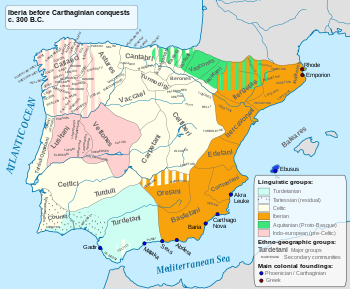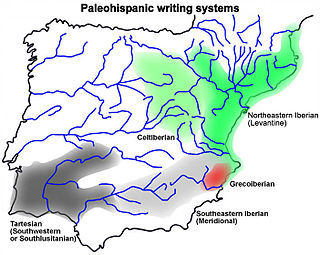
The Ausetani were an ancient Iberian (pre-Roman) people of the Iberian Peninsula (the Roman Hispania). They are believed to have spoken the Iberian language. They lived in the eponymous region of Ausona and gave their name to the Roman city of Ausa.

The Ausetani were an ancient Iberian (pre-Roman) people of the Iberian Peninsula (the Roman Hispania). They are believed to have spoken the Iberian language. They lived in the eponymous region of Ausona and gave their name to the Roman city of Ausa.
The Ausetani minted their own coins which bore the inscription ausesken in northeastern Iberian script that is interpreted in Iberian language as a self-reference to the ethnic name of that people: from the Ausetani or from those of Ausa.

The Iberians were an ancient people settled in the eastern and southern coasts of the Iberian Peninsula, at least from the 6th century BCE. They are described in Greek and Roman sources. Roman sources also use the term Hispani to refer to the Iberians.
The Lusitanians were an Indo-European-speaking people living in the far west of the Iberian Peninsula, in present-day central Portugal and Extremadura and Castilla y Leon of Spain. After its conquest by the Romans, the land was subsequently incorporated as a Roman province named after them (Lusitania).

The Cynetes or Conii were one of the pre-Roman peoples of the Iberian Peninsula, living in today's Algarve and Lower Alentejo regions of southern Portugal, and the southern part of Badajoz and the northwestern portions of Córdoba and Ciudad Real provinces in Spain before the 6th century BC. According to Justin's epitome, the mythical Gargoris and Habis were their founding kings.

The Turdetani were an ancient pre-Roman people of the Iberian Peninsula, living in the valley of the Guadalquivir, in what was to become the Roman Province of Hispania Baetica. Strabo considers them to have been the successors to the people of Tartessos and to have spoken a language closely related to the Tartessian language.

The Bastetani or Bastuli were an ancient Iberian (pre-Roman) people of the Iberian Peninsula. They are believed to have spoken the Iberian language. The relationship between the Iberian Bastetani and the Tartessian Mastieni is not entirely clear.

The Ilergetes were an ancient Iberian (Pre-Roman) people of the Iberian Peninsula who dwelt in the plains area of the rivers Segre and Cinca towards Iberus (Ebro) river, and in and around Ilerda/Iltrida, present-day Lleida/Lérida. They are believed to have spoken the Iberian language.

The Indigetes were an ancient Iberian (Pre-Roman) people of the eastern side of the Iberian Peninsula. They are believed to have spoken the Iberian language.

The Laietani were an ancient Iberian (Pre-Roman) people of the Iberian Peninsula. They inhabited the area occupied by the city of Barcelona. One of the main thoroughfares of the city, Via Laietana, is named after the Laietani. They are believed to have spoken an Iberian language.

The Cessetani were an ancient Iberian (Pre-Roman) people of the Iberian peninsula. They are believed to have spoken the Iberian language. Their territory extended along the coast between the Coll de Balaguer and the Garraf Massif and was limited in the west by the Prades Mountains.

The Ilercavones were an ancient Iberian (Pre-Roman) people of the Iberian peninsula. They are believed to have spoken an Iberian language.

The Edetani were an ancient Iberian (Pre-Roman) people of the Iberian peninsula. They are believed to have spoken a form of the Iberian language.

The Greco-Iberian alphabet is a direct adaptation of an Ionic variant of a Greek alphabet to the specifics of the Iberian language, thus this script is an alphabet and lacks the distinctive characteristic of the paleohispanic scripts that present signs with syllabic value, for the occlusives and signs with monophonemic value for the rest of consonants and vowels.

The Lacetani were an ancient Iberian (pre-Roman) people of the Iberian Peninsula. They are believed to have spoken an Iberian language.

Hispania was the Roman name for the Iberian Peninsula. Under the Roman Republic, Hispania was divided into two provinces: Hispania Citerior and Hispania Ulterior. During the Principate, Hispania Ulterior was divided into two new provinces, Baetica and Lusitania, while Hispania Citerior was renamed Hispania Tarraconensis. Subsequently, the western part of Tarraconensis was split off, initially as Hispania Nova, which was later renamed "Callaecia". From Diocletian's Tetrarchy onwards, the south of the remainder of Tarraconensis was again split off as Carthaginensis, and all of the mainland Hispanic provinces, along with the Balearic Islands and the North African province of Mauretania Tingitana, were later grouped into a civil diocese headed by a vicarius. The name Hispania was also used in the period of Visigothic rule.

The Sedetani were an ancient Iberian (Pre-Roman) people of the Iberian Peninsula. They are believed to have spoken a form of the Iberian language.
The Sordones were an ancient (Pre-Roman) people of the Iberian Peninsula. They are believed to have spoken the Iberian language. Their territory was located in the Roussillon, in what is now the French département of Pyrénées-Orientales and was limited in the west by the Pyrenees. They are classified as ancient Iberian or as ancient Gauls according to the sources.

The Cerretani or Ceretani were an ancient pre-Roman people of the Iberian Peninsula who occupied what became the modern-day Cerdanya, in the valley Segre and part of Aragon. Their neighbours from the east were Ausetani and from the south Ilergetes. Their capital was Julia Libyca, modern Llívia. They are noted in Greek and Roman geographical treatises.

The Castellani or 'Castelani' were an ancient Iberian or Pre-Roman people of the Iberian Peninsula. They inhabited the bottom of the eastern Pyrenees in the northern Tarraconense.
The suffix -tania or -etania denotes a territory or region in the Iberian Peninsula. Its historical origin is in the pre-Roman Iberia. Its etymological origin is discussed by linguists. Spanish Jesuit philologist Hervás y Panduro proposed their link to the Celtic languages, in which the root *tan or *taín means department or region. "In Irish, tan expresses the idea of country, territory."